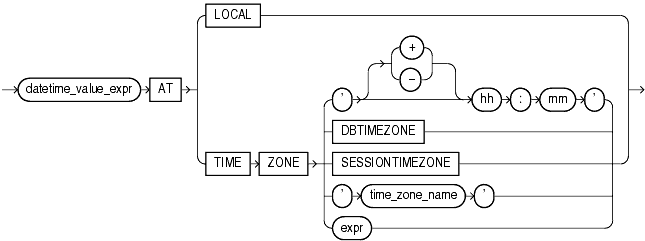| Oracle® Database SQL Reference 10g Release 1 (10.1) Part Number B10759-01 |
|
|
View PDF |
| Oracle® Database SQL Reference 10g Release 1 (10.1) Part Number B10759-01 |
|
|
View PDF |
A datetime expression yields a value of one of the datetime datatypes.

A datetime_value_expr can be a datetime column or a compound expression that yields a datetime value. Datetimes and intervals can be combined according to the rules defined in Table 2-6. The three combinations that yield datetime values are valid in a datetime expression.
If you specify AT LOCAL, Oracle uses the current session time zone.
The settings for AT TIME ZONE are interpreted as follows:
The string '(+|-)HH:MM' specifies a time zone as an offset from UTC.
DBTIMEZONE: Oracle uses the database time zone established (explicitly or by default) during database creation.
SESSIONTIMEZONE: Oracle uses the session time zone established by default or in the most recent ALTER SESSION statement.
time_zone_name: Oracle returns the datetime_value_expr in the time zone indicated by time_zone_name. For a listing of valid time zone names, query the V$TIMEZONE_NAMES dynamic performance view.
|
Note: Timezone region names are needed by the daylight savings feature. The region names are stored in two time zone files. The default time zone file is a small file containing only the most common time zones to maximize performance. If your time zone is not in the default file, then you will not have daylight savings support until you provide a path to the complete (larger) file by way of theORA_TZFILE environment variable. |
|
See Also:
|
expr: If expr returns a character string with a valid time zone format, Oracle returns the input in that time zone. Otherwise, Oracle returns an error.
The following example converts the datetime value of one time zone to another time zone:
SELECT FROM_TZ(CAST(TO_DATE('1999-12-01 11:00:00',
'YYYY-MM-DD HH:MI:SS') AS TIMESTAMP), 'America/New_York')
AT TIME ZONE 'America/Los_Angeles' "West Coast Time"
FROM DUAL;
West Coast Time
------------------------------------------------
01-DEC-99 08.00.00.000000 AM AMERICA/LOS_ANGELES